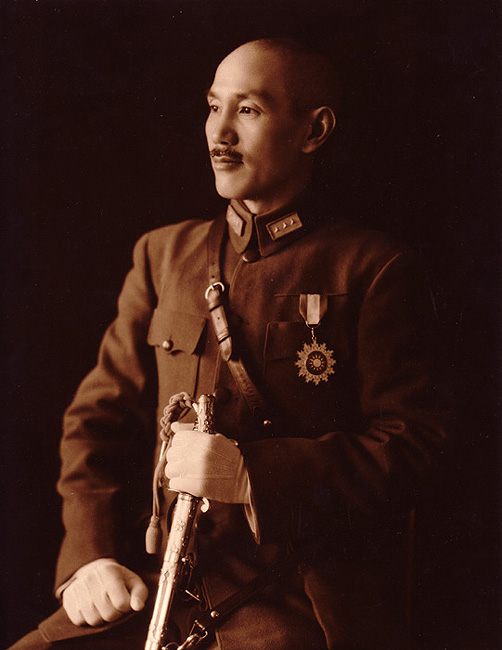In 2004, Chen Sui-bian was re-elected, and KMT supporters (shall we say) “gave the appearance of” trying to get him to resign on charges of corruption. I’ve never liked Chen Sui-bian, and I do believe that he was as crooked as a dog’s hind leg. He reminds me of the fence that was so crooked that, when a pig tried to jump through a hole in the fence, he kept landing on the same side of the fence. Nonetheless, if find the accusations ironic coming from the KMT.
Cross-strait politics can be quite surreal. Beijing has no objection to the KMT claiming that their regime governs not only Taiwan but all of China, Mongolia (including Outer Mongolia, which is independent of both China and Taiwan), Tibet, East Turkestan, and Hong Kong; but they fly into paroxysms of rage when a Taiwanese politician claims that Taiwan governs only Taiwan.
There's a simple explanation for this. (Maybe you've seen the Keebler cookies commercials.) If a marketer of junk food were to claim that his cookies were healthy for you, the Food and Drug Administration would attack them with the full force of the law. That's because they fear that somebody might believe that it's true. On the other hand, Keebler can get away with saying that their cookies are baked by elves in hollow trees, because no one could possibly believe it. It's the same way with claims of Taiwan independence versus claims of a vast "Chinese" empire with Taipei as its capital city.
In politics, there are many kinds of horses. Some are show horses; some are work horses; and some Trojan horses; some are a horse of a different color. Chen Sui-bian was a race horse. He conducted his administration as if it were a race for public office; it was a public office he had already won. For eight wasted years, he pulled stunts to rally the party faithful and little else. His divisive stunts served only to solidify support from his core supporters, alienate potential supporters, and do little or nothing to deepen Taiwan’s sovereignty.
In 2008, Chinese native Ma Ying-jeou’s campaign for the presidency was so image-driven that would put Nike and Amway to shame. Ma was elected president of Taiwan and the fantasy of Ma being president of all of China, Tibet, and so on, reached ultra-surrealistic proportions. That is, when no Chinese were around.
I’m sure you’ve seen five-year-olds playing games of make believe. In their world of make believe, a child can be—well—the emperor of China, and other children can be other members of royalty. As soon as an adult enters the room, the fantasy disappears.
That’s what happens when even a lowly Chinese official comes to Taiwan. ROC flags disappear, music stores playing songs in the Taiwanese language are forced to close, Taiwanese demonstrators are relocated to a spot well out of sight, and President Ma suddenly becomes “Mr. Ma” to his guest. His guest, who is less than nobody back in his native China, received the red carpet treatment in Taiwan. Taiwan’s highest government official becomes subservient to China’s lowest government official.
Over the past few years, Ma has made around fifteen secret agreements with China. More publicly, the KMT-controlled legislature approved an agreement called ECFA, which gives Beijing substantial control over Taiwan’s export economy. Ma excused his actions by claiming that the agreement was economic rather than political. Of course, we all know that control over a vast segment of a nation’s economy amounts to control over that nation.
During the 2008 campaign, Ma had promised not to enter political negotiations with Beijing during his first term of office. On the other hand, Ma’s promises have never seemed an impediment to Ma, and neither has public opinion. He once said that he didn’t have to listen to public opinion because the voters had given him a mandate (58%).
Originally, the 2012 presidential election was scheduled for March 2012. The Chinese Nationalist Party is now making noises about holding the election on Robert E. Lee's birthday, January 19.
The excuse given for the change is that it would save the taxpayers NT$500,000 (about US$17,000) to hold both the December 2011 legislative elections and the 2012 presidential election on the same day.
Left unmentioned is that Sometime-president Ma is also proposing to raise the salaries of government bureaucrats (the most likely KMT supporters) a total of NT$2 billion, during a time when wages for the rest of Taiwan have remained nearly stagnant for ten years. Left unmentioned, is that young people (the most likely DPP supporters) reaching voting age between January and March will not be allowed to vote. Left unmentioned is that combining the two elections would attract more lukewarm voters (the most likely KMT supporters).
Ma spent several years promoting the expansion of a major polluting petrochemical plant in a wetlands area, against the wishes of people living in the area. Now that it has become a major issue in the 2012 campaign, Ma has come out against the plant. No problem. When he loses the 2012 election, he'll have four months to change all that.
Ma spent several years promoting the expansion of a major polluting petrochemical plant in a wetlands area, against the wishes of people living in the area. Now that it has become a major issue in the 2012 campaign, Ma has come out against the plant. No problem. When he loses the 2012 election, he'll have four months to change all that.
There is also a movement afoot to allow absentee voting for businessmen in China. Given Beijing's desire to control Taiwan at all costs, this is an open invitation to voter fraud.
The January 2012 presidential election is only nine months away. Ma’s popularity is below that of either of his potential opponents, and it’s continuing to drop. Small wonder, then, that Beijing is now pressuring Ma to enter political negotiations with them. That’s shorthand for surrendering Taiwan to Beijing before Ma is booted out of office. With more than four months between the election and the inauguration of the next president, Ma Ying-jeou will be at liberty to pull all manner of shenanigans at the expense of Taiwan's hard-won freedoms.
 The KMT-controlled legislature has consistently blocked Taiwan’s purchases of defensive weapons, for the past ten years. (Only now, after the KMT has lost most of the bi-elections, and with the presidential election less than a year away , the KMT is making a show of bidding for purchases.) As a result, Beijing now has the military capability to invade and take over Taiwan. All Beijing lacks is a pretext.
The KMT-controlled legislature has consistently blocked Taiwan’s purchases of defensive weapons, for the past ten years. (Only now, after the KMT has lost most of the bi-elections, and with the presidential election less than a year away , the KMT is making a show of bidding for purchases.) As a result, Beijing now has the military capability to invade and take over Taiwan. All Beijing lacks is a pretext. If Ma and his KMT revert to type, one of three things may happen. Either they will rush to turn over Taiwan to China before the January 2012 election, or they will presume to turn over Taiwan after the election but before President-elect Tsai Ying-wen is inaugurated president, or they will riot as they did in 2000 and give the Chicoms the pretext that they’re invading Taiwan to restore order. They didn’t have the military capability to take over Taiwan in 2000. Thanks to KMT blockages of Taiwanese arms purchases, they now have that capability.
In any of those three scenarios, it would be hard to imagine the KMT not arranging to maintain perpetual rule over Taiwan with Beijing’s blessing and guidance. Only the vigilance and will of the Taiwanese can prevent any of these scenarios from becoming a reality.









